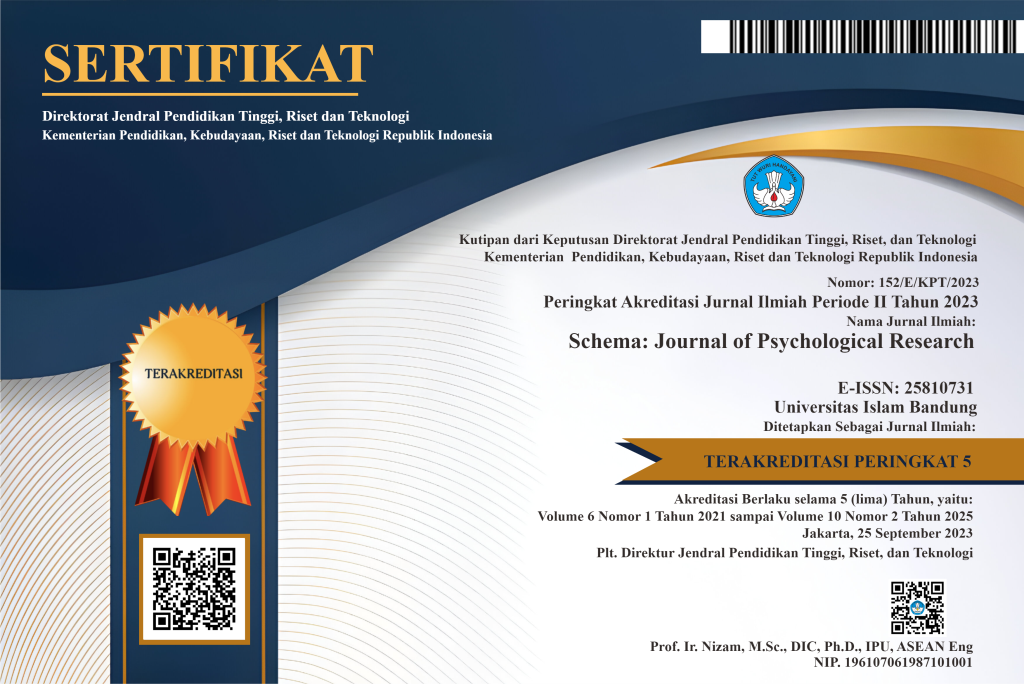Scoping Review: Gaming Decision in Problematic Gamers
Abstract
Problematic gaming ditandai dengan gangguan kendali atas perilaku bermain game yang mengakibatkan pemainnya memutuskan kembali untuk bermain game, meskipun mengetahui adanya konsekuensi negatif yang signifikan. Pada sejumlah studi terdahulu, menunjukkan inkonsistensi kontribusi aspek pengambilan keputusan untuk bermain game; dimana terdapat hasil yang menunjukkan kemampuan pengambilan keputusan problematic gamers yang memang terganggu, namun pada penelitian lain menyatakan adanya kualitas pengambilan keputusan yang lebih baik dibanding kelompok non-gamers. Scoping review ini bertujuan untuk menghasilkan tinjauan komprehensif tentang literatur yang relevan untuk memandu penelitian mengenai pengambilan keputusan untuk bermain game (gaming decision) pada problematic gamers. Dari 5 sumber database, diambil 9 artikel yang memenuhi kriteria. Hasil menunjukkan bahwa pada berbagai penelitian mengenai gaming decision, (1)metode kuantitatif juga kualitatif menjadi pilihan desain riset, (2)analisa dilakukan dengan mengaitkan pengambilan keputusan untuk bermain game dengan mekanisme proses kognitif pada diri problematic gamers, (3)membandingkan proses kognitif antar kelompok dengan karakteristik yang berbeda, (4)menggunakan sejumlah instrumen decision making task untuk mengukur perbedaan proses dan kualitas pengambilan keputusan, serta (5)dominasi partisipan dengan kriteria Internet Gaming Disorders yang menunjukkan kekurangmampuan dalam pengambilan keputusan, dipengaruhi kemampuan kontrol kognitif serta rendahnya kemampuan memanfaatkan umpan balik untuk memperbaiki pengambilan keputusan selanjutnya.
Keywords
Full Text:
PDFReferences
Sulistya, R (27 November 2020). Jumlah gamers online Indonesia terbanyak di asia tenggara. Republika.co.id.https://republika.co.id/berita/qkg7el463/jumlah-emgamers-onlineem-indonesia-terbanyak-di-asia-tenggara
https://newzoo.com/resources/trend-reports/newzoo-global-games-market-report-2020-light-version
Adalier, A., & Balkan, E. (2012). The relationship between internet addiction and psychological symptoms. International Journal of Global Education, 1(2).
Han, D. H., Hwang, J. W., & Renshaw, P. F. (2011). Bupropion sustained release treatment decreases craving for video games and cue-induced brain activity in patients with Internet video game addiction
Li, H., & Wang, S. (2013). The role of cognitive distortion in online game addiction among Chinese adolescents. Children and youth services review, 35(9), 1468-1475.
Laconi, S., Kaliszewska-Czeremska, K., Gnisci, A., Sergi, I., Barke, A., Jeromin, F., ... & Király, O. (2018). Cross-cultural study of Problematic Internet Use in nine European countries. Computers in Human Behavior, 84, 430-440.
Kim, N. R., Hwang, S. S. H., Choi, J. S., Kim, D. J., Demetrovics, Z., Király, O., ... & Choi, W. (2016). Characteristics and psychiatric symptoms of internet gaming disorder among adults using self-reported DSM-5 criteria. Psychiatry investigation, 13(1), 58.
Andreassen, C. S., Billieux, J., Griffiths, M. D., Kuss, D. J., Demetrovics, Z., Mazzoni, E., & Pallesen, S. (2016). The relationship between addictive use of social media and video games and symptoms of psychiatric disorders: A large-scale cross-sectional study. Psychology of Addictive Behaviors, 30(2), 252
Rehbein, F., Kliem, S., Baier, D., Mößle, T., & Petry, N. M. (2015). Prevalence of internet gaming disorder in German adolescents: Diagnostic contribution of the nine DSM‐5 criteria in a state‐wide representative sample. Addiction, 110(5), 842-851. https://doi.org/10.1111/add.12849
Carli, V., Durkee, T., Wasserman, D., Hadlaczky, G., Despalins, R., Kramarz, E., ... & Kaess, M. (2013). The association between pathological internet use and comorbid psychopathology: a systematic review. Psychopathology, 46(1), 1-13. https://doi.org/10.1159/000337971
Kardefelt‐Winther, D., Heeren, A., Schimmenti, A., van Rooij, A., Maurage, P., Carras, M., ... & Billieux, J. (2017). How can we conceptualize behavioural addiction without pathologizing common behaviours?. Addiction, 112(10), 1709-1715.
Billieux, J., Schimmenti, A., Khazaal, Y., Maurage, P., & Heeren, A. (2015). Are we overpathologizing everyday life? A tenable blueprint for behavioral addiction research. Journal of behavioral addictions, 4(3), 119-123.
American Psychiatric Association (APA). (2013). Diagnostic and Statistical manual of mental disorders (5th ed) (DSM-5). Washington, DC : Author
Przybylski, A. K., Weinstein, N., & Murayama, K. (2017). Internet gaming disorder: Investigating the clinical relevance of a new phenomenon. American Journal of Psychiatry, 174(3), 230-236
King, D. L., & Delfabbro, P. H. (2019). Internet gaming disorder: Theory, assessment, prevention, and treatment.
Brand, M., Young, K. S., Laier, C., Wölfling, K., & Potenza, M. N. (2016). Integrating psychological and neurobiological considerations regarding the development and maintenance of specific Internet-use disorders: an Interaction of Person-Affect-Cognition-Execution (I-PACE) model. Neuroscience & Biobehavioral Reviews, 71, 252–266.
Petry, N. M., Rehbein, F., Gentile, D. A., Lemmens, J. S., Rumpf, H. J., Mößle, T., ... & O'Brien, C. P. (2014). An international consensus for assessing internet gaming disorder using the new DSM‐5 approach. Addiction, 109(9), 1399-1406.
Noël, X., Brevers, D., & Bechara, A. (2013). A triadic neurocognitive approach to addiction for clinical interventions. Frontiers in psychiatry, 4, 179.
Dong, G., Li, H., Wang, L., & Potenza, M. N. (2017). Cognitive control and reward/loss processing in Internet gaming disorder: results from a comparison with recreational Internet game-users. European Psychiatry, 44, 30-38
Brand, M., Wegmann, E., Stark, R., Müller, A., Wölfling, K., Robbins, T. W., & Potenza, M. N. (2019). The Interaction of Person-Affect-Cognition-Execution (I-PACE) model for addictive behaviors: Update, generalization to addictive behaviors beyond internet-use disorders, and specification of the process character of addictive behaviors. Neuroscience & Biobehavioral Reviews, 104, 1-10.
Dong, G., & Potenza, M. N. (2014). A cognitive-behavioral model of Internet gaming disorder: Theoretical underpinnings and clinical implications. Journal of psychiatric research, 58, 7-11.
Wei, L., Zhang, S., Turel, O., Bechara, A., & He, Q. (2017). A tripartite neurocognitive model of internet gaming disorder. Frontiers in Psychiatry, 8, 285.
Lin, C. H., Wang, C. C., Sun, J. H., Ko, C. H., & Chiu, Y. C. (2019). Is the clinical version of the Iowa gambling task relevant for assessing choice behavior in cases of Internet addiction?. Frontiers in psychiatry, 10, 232.
Metcalf, O., & Pammer, K. (2014). Impulsivity and related neuropsychological features in regular and addictive first person shooter
Colquhoun, H. L., Levac, D., O'Brien, K. K., Straus, S., Tricco, A. C., Perrier, L., ... & Moher, D. (2014). Scoping reviews: time for clarity in definition, methods, and reporting. Journal of clinical epidemiology, 67(12), 1291-1294.
Peters, M. D., Godfrey, C. M., Khalil, H., McInerney, P., Parker, D., & Soares, C. B. (2015). Guidance for conducting systematic scoping reviews. JBI Evidence Implementation, 13(3), 141-146.
Arksey, H., & O'Malley, L. (2005). Scoping studies: towards a methodological framework. International journal of social research methodology, 8(1), 19-32.
Dalbudak, E., Evren, C., Aldemir, S., Coskun, K. S., Ugurlu, H., & Yildirim, F. G. (2013). Relationship of internet addiction severity with depression, anxiety, and alexithymia, temperament and character in university students. Cyberpsychology, Behavior, and Social Networking, 16(4), 272-278.
Ko C-H, Hsiao S, Liu G-C, Yen J-Y, Yang M-J, et al. (2010) The characteristics of decision making, potential to take risks, and personality of college students with Internet addiction. PsychiatRes 175: 121–125. doi: 10.1016/j.psychres.2008.10.004 PMID: 19962767
Fox, J., & Tang, W. Y. (2014). Sexism in online video games: The role of conformity to masculine norms and social dominance orientation. Computers in human behavior, 33, 314-320.
Yen, J. Y., Yen, C. F., Chen, C. S., Wang, P. W., Chang, Y. H., & Ko, C. H. (2012). Social anxiety in online and real-life interaction and their associated factors. Cyberpsychology, Behavior, and Social Networking, 15(1), 7-12.
Ko, C. H., & Yen, J. Y. (2014). The criteria to diagnose internet gaming disorder from causal online gamer. Addiction (Abingdon, England), 109(9), 1411-1412.
Chou C, Condron L, Belland JC (2005) A review of the research on Internet addiction. Educ Psychol Rev 17: 363–388. doi: 10.1007/s10648-005-8138-1
Young, K. S. (1998). Internet addiction: the emergence of a new clinical disorder. Cyberpsychology & Behavior, 1, 237–244.
Chen, S. H., Weng, L. J., Su, Y. J., Wu, H. M., & Yang, P. F. (2003). Development of a Chinese Internet addiction scale and its psychometric study. Chinese Journal of Psychology.
Bechara, A. (2005). Decision making, impulse control and loss of willpower to resist drugs: a neurocognitive perspective. Nature neuroscience, 8(11), 1458-1463.
Lucantonio, F., Stalnaker, T. A., Shaham, Y., Niv, Y., & Schoenbaum, G. (2012). The impact of orbitofrontal dysfunction on cocaine addiction. Nature neuroscience, 15(3), 358-366.
Paulus, M. P. (2007). Decision-making dysfunctions in psychiatry—altered homeostatic processing?. Science, 318(5850), 602-606.
Pawlikowski, M., & Brand, M. (2011). Excessive Internet gaming and decision making: do excessive World of Warcraft players have problems in decision making under risky conditions?. Psychiatry research, 188(3), 428-433.
Yao, Y. W., Chen, P. R., Chen, C., Wang, L. J., Zhang, J. T., Xue, G., ... & Fang, X. Y. (2014). Failure to utilize feedback causes decision-making deficits among excessive Internet gamers. Psychiatry research, 219(3), 583-588.
Sun, D. L., Chen, Z. J., Ma, N., Zhang, X. C., Fu, X. M., & Zhang, D. R. (2009). Decision-making and prepotent response inhibition functions in excessive internet users. CNS spectrums, 14(2), 75-81.
Xu, S. H. (2012). Internet addicts' behavior impulsivity: Evidence from the Iowa Gambling Task. Acta Psychologica Sinica.
Decker, S. A., & Gay, J. N. (2011). Cognitive-bias toward gaming-related words and disinhibition in World of Warcraft gamers. Computers in Human Behavior, 27(2), 798-810.
Schneider, L.A., King, D.L., Delfabbro, P.H., 2018. Maladaptive coping styles in adolescents with Internet gaming disorder symptoms. Int. J. Ment. Health Addict. 16 (4), 905–916. https://doi.org/10.1007/s11469-017-9756-9.
Zhou, Z., Yuan, G., & Yao, J. (2012). Cognitive biases toward Internet game-related pictures and executive deficits in individuals with an Internet game addiction. PloS one, 7(11), e48961
Goudriaan, A. E., Oosterlaan, J., de Beurs, E., & van den Brink, W. (2005). Decision making in pathological gambling: a comparison between pathological gamblers, alcohol dependents, persons with Tourette syndrome, and normal controls. Cognitive brain research, 23(1), 137-151.
DOI: https://doi.org/10.29313/schema.v8i2.12784
Refbacks
- There are currently no refbacks.
Indexed by:
This work is licensed under a Creative Commons Attribution-NonCommercial-ShareAlike 4.0 International License.












